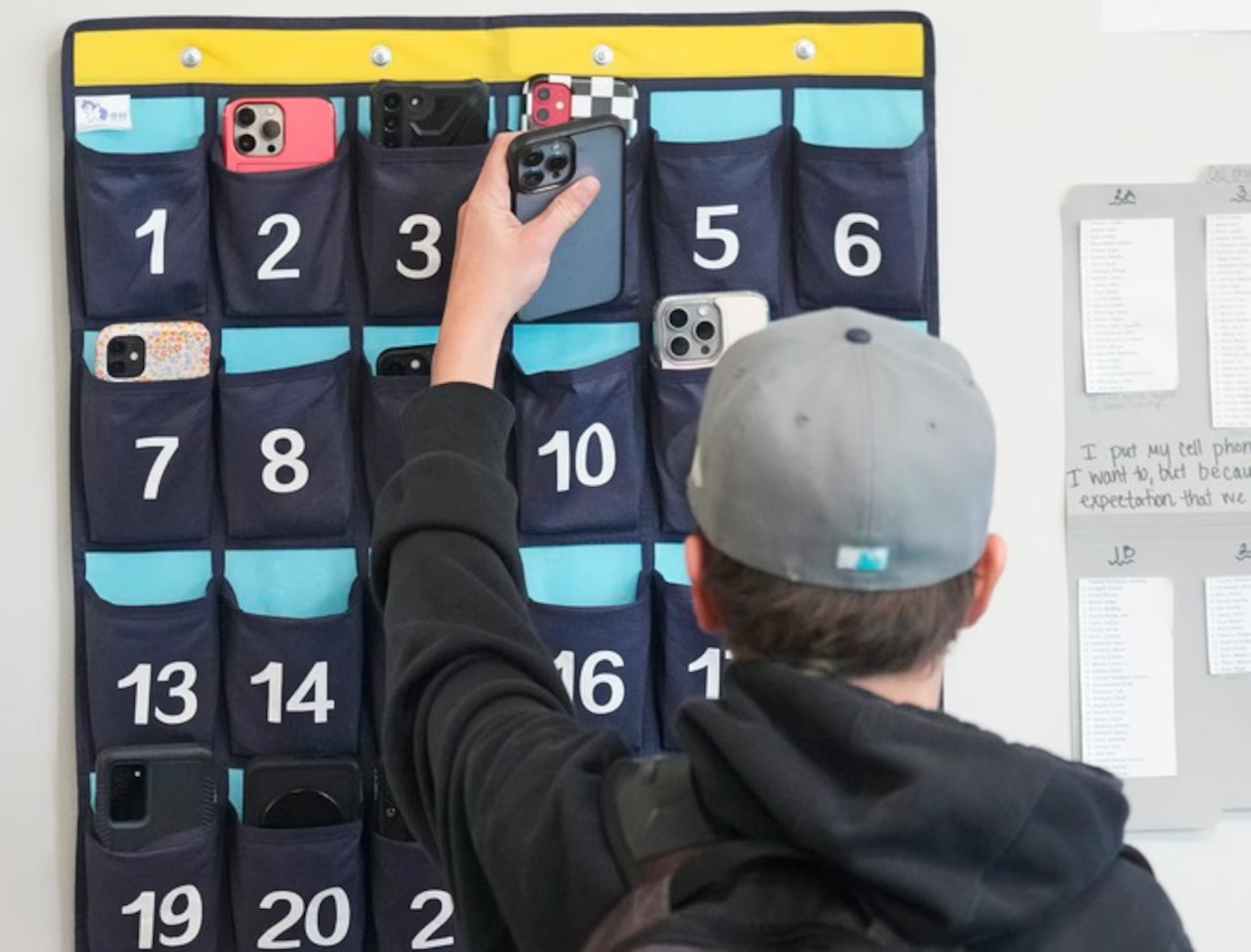 The use of mobile phones in class is one of the most controversial topics in schools today. My own classroom experience, supported by research, strongly indicates that a complete ban on cellphones is not the answer. Rather, guided integration under a framework of clear rules, supportive school leadership and relational teaching practices can turn cellphones into effective tools for learning. I speak not only as an educator but as a professional who has seen students use their devices responsibly to research, collaborate, and document their learning and practice digital citizenship. With the support of my school administration, we put in place cellphone use policy founded on structure, trust and accountability practices.
The use of mobile phones in class is one of the most controversial topics in schools today. My own classroom experience, supported by research, strongly indicates that a complete ban on cellphones is not the answer. Rather, guided integration under a framework of clear rules, supportive school leadership and relational teaching practices can turn cellphones into effective tools for learning. I speak not only as an educator but as a professional who has seen students use their devices responsibly to research, collaborate, and document their learning and practice digital citizenship. With the support of my school administration, we put in place cellphone use policy founded on structure, trust and accountability practices.  The outcome? Most students responded using their devices purposefully, respectfully and productively.
The outcome? Most students responded using their devices purposefully, respectfully and productively.
While I understand the issues of cyber bullying, distraction and mental health effects raised by the opposition, these concerns arise more from a lack of education and responsible use rather than technology itself. As a teen, while I have been distracted by a cellphone (not detrimentally), I have never felt the need to cyber bully anyone or feel “less than” due to social media feedback. Why? My moral compass would not allow it. Surely, times have changed and there are more apps and content now; but I can safely say the same for a lot of my students. Additionally, I was taught and supported to think highly of myself and to do to others what I would want them to reciprocate. Rather than a knee-jerk prohibition of cellphones, why not provide that kind of support for our students?
As a teen, while I have been distracted by a cellphone (not detrimentally), I have never felt the need to cyber bully anyone or feel “less than” due to social media feedback. Why? My moral compass would not allow it. Surely, times have changed and there are more apps and content now; but I can safely say the same for a lot of my students. Additionally, I was taught and supported to think highly of myself and to do to others what I would want them to reciprocate. Rather than a knee-jerk prohibition of cellphones, why not provide that kind of support for our students?
Campbell et al.’s 2024 scooping review observes that “bans are often driven by media-amplified moral panic rather than consistent empirical evidence” and the lack of randomized controlled trials means it is impossible to definitively demonstrate that bans enhance academic or mental health outcomes. Conversely, Davis and Koepke (2016) determined that supportive school climates and positive adult-student relationships were more effective as deterrents to cyber bullying than outright prohibitions. This aligns with what I have discovered in my own practice: when students feel visible, supported and guided, they are less inclined to abuse technology.
Conversely, Davis and Koepke (2016) determined that supportive school climates and positive adult-student relationships were more effective as deterrents to cyber bullying than outright prohibitions. This aligns with what I have discovered in my own practice: when students feel visible, supported and guided, they are less inclined to abuse technology.
In a CNN report, one former public school principal noted the importance of teaching digital literacy, citing that “students need to learn how to use social media and with an outright ban, we are not getting any closer to teaching those skills”. Digital literacy is not optional, it’s foundational. Denying students access to phones in class can restrict the opportunity to build these competencies.
 Mental health issues should not bring us to digital abstinence but to digital mentorship. Students are not digital natives by default; they require guidance. As the scoping review from Campbell et al. (2024) points out, banning phones may ironically place the onus of teaching digital literacy on families who do not feel prepared to do so. Teachers can host “tech-check-in circles” where students discuss what they witness online, both the inspiring and the toxic. These discussions can enrich our understanding of digital wellness and emotional resilience when a student is involved in online drama, our conversation doesn’t start with punishment —it starts with connection. As educators, our job is not only to shield students from harm but to equip them to thrive in the space they already occupy. Cellphones are not destroying classrooms—misuse, digital ignorance, and policy implementation is.
Mental health issues should not bring us to digital abstinence but to digital mentorship. Students are not digital natives by default; they require guidance. As the scoping review from Campbell et al. (2024) points out, banning phones may ironically place the onus of teaching digital literacy on families who do not feel prepared to do so. Teachers can host “tech-check-in circles” where students discuss what they witness online, both the inspiring and the toxic. These discussions can enrich our understanding of digital wellness and emotional resilience when a student is involved in online drama, our conversation doesn’t start with punishment —it starts with connection. As educators, our job is not only to shield students from harm but to equip them to thrive in the space they already occupy. Cellphones are not destroying classrooms—misuse, digital ignorance, and policy implementation is.

You did a great job on your debate Sadi! I really appreciated your points and felt like a lot of what you said was easy to relate to. I agree that banning phones completely isn’t the best solution. With the right rules and support from both teachers and school leaders, phones can actually be a helpful tool in the classroom.
I liked how you mentioned that many of the issues around phones, like distraction or cyberbullying, are more about how we teach students to use them, not the phones themselves. Teaching digital responsibility is so important, and I also liked your idea of having open conversations with students about their online experiences. That kind of trust and connection goes a long way.
I agree with your comments because those are the same experiences I’m currently facing as a teacher. When students are supported, taught proper boundaries, and held accountable, they tend to use their phones in more positive and respectful ways. Like you, I believe that teaching students how to use technology responsibly is a better path than just removing it altogether.
Thank you!
Hi Sadi,
I agree with Danielle, you did an excellent job on your debate! Before the debate, I thought that cell phones should be banned in the classroom. However, after considering the arguments presented, my perspective has changed. I found your point about regulating rather than prohibiting cell phone use particularly convincing. I agree that it is essential to teach students responsible use of technology, including cell phones, and now believe that banning them outright may not be the best approach. From the debate, I gained valuable insights into how educators utilize cell phones in their classroom activities. Also, your emphasis on moral integrity as a reason why you would never cyberbully someone is a really important point that gets overlooked. As parents and educators, we can teach our children kindness, which has nothing to do with technology but influences how they behave when using it. It is crucial to teach children to be kind, whether they are interacting with someone in person or online. Once again, congratulations on a great debate and blog post. Your arguments have changed my perspective on the role of cell phones in the classroom.
Jenna
Hey Sadi!
First off, great work in the debate! I think this was a tough topic and there are so many valid points for both sides. I ultimately agree with your side of the debate: no, cell phones should not be banned. This was my initial opinion and your valid points throughout the discussion and the resources you shared helped me hold that belief. I think a ‘ban’ is rarely the answer (to anything) and, instead, education needs to be at the forefront of issues such as cell phone usage at school.
I agree with your thoughts here: students require education when it comes to cell phone use and who better than educators to guide them towards safe, responsible, and productive cell phone engagement? We have the time, space and resources to support students in their overall relationship with their phone. Allowing cell phones in class – yes with firm rules and boundaries – we have ample teachable moments to help kids.
I love the idea of a ‘tech check-in circle’ to open the conversation around issues happening online and provide a safe space for connection around these issues that students are inevitably navigating. Creating an environment like this will help with the reduction of mental health concerns and bullying online, or at least will aid students in managing these problems by creating a space of trust and fostering resilience.
Lots to consider- thanks for the thought-provoking debate and blog post!
Teagan Bryden